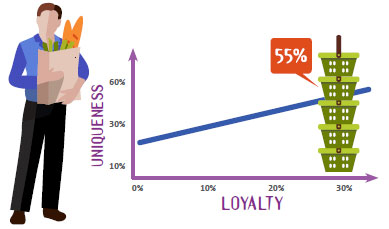 Every retailer claims they’re different from their competitors. But a recent study by Daymon shows retailers are in fact much more similar than they think. When it comes to food retailing in particular, up to 98 percent of the national brand products carried by a retailer are also carried by its competitors. In other words, for every 100 big-name products on the shelves, only two are different from the store down the street.
Every retailer claims they’re different from their competitors. But a recent study by Daymon shows retailers are in fact much more similar than they think. When it comes to food retailing in particular, up to 98 percent of the national brand products carried by a retailer are also carried by its competitors. In other words, for every 100 big-name products on the shelves, only two are different from the store down the street.
The good news is that there are other ways for retailers to differentiate themselves—and as Daymon’s study showed, unique private brands play a key role. On average, private brand products make up about nine percent of retailers’ product assortment, yet account for 20 percent of sales. What’s more, the more differentiated a retailer’s private brand product assortment, the more loyal shoppers are to that retailer.
“This clearly demonstrates that the goal of private brand and the definition of value is no longer simply about duplicating national brands at a lower price,” explains Charity Kobrzycki, Manager of Insights for Daymon. “Consumers are looking for products that are authentic and offer solutions to make their lives easier. Private brand products that cater to those needs are well-positioned to drive sales and loyalty.”
In fact, says Kobrzycki, private brands may even have an advantage over national brands when introducing new and unique products. “If a national brand introduces a totally new item, consumers have to become familiar with it and build trust around it. With private brand items, much of that trust is already there and the retailer is continuing to build on that investment.”
 There are a number of major retailers in the United States and abroad that are already proving the success of differentiation via private brands. Limited assortment retailers like Trader Joe’s, Aldi and Lidl, for example, stock their shelves with up to 80 percent private brand products. Similarly, leading traditional grocers like Kroger in the U.S. and Tesco in the United Kingdom have well-developed, multi-tiered private brand assortments that offer unique solutions to meet the needs of today’s consumers—driving higher percentages of basket spend and loyalty in the process.
There are a number of major retailers in the United States and abroad that are already proving the success of differentiation via private brands. Limited assortment retailers like Trader Joe’s, Aldi and Lidl, for example, stock their shelves with up to 80 percent private brand products. Similarly, leading traditional grocers like Kroger in the U.S. and Tesco in the United Kingdom have well-developed, multi-tiered private brand assortments that offer unique solutions to meet the needs of today’s consumers—driving higher percentages of basket spend and loyalty in the process.
Kobrzycki notes, however, that it’s not simply about putting new private brand products on the shelves and hoping shoppers will come. “There are a number of different aspects retailers have to consider—not only promoting private brand products through ads, but also:
- making sure the products are on display in the store
- talking to customers about the products and the brand on social media
- creating an overall experience with the brand that makes consumers want to engage and return to the store.”
As Jim Holbrook, CEO of Daymon puts it, “Shoppers today are looking for ways to be disloyal. They aren’t interested in seeing the same thing; they are demanding better service, selection and experience. Retailers: it’s up to you to prove to shoppers that you deserve their loyalty. There’s a wealth of possibilities across the store, and it starts with your own brand.”
To learn more about these and other private brand insights from Daymon, contact Charity Kobrzycki, Manager of Insights, at ckobrzycki@daymon.com.

